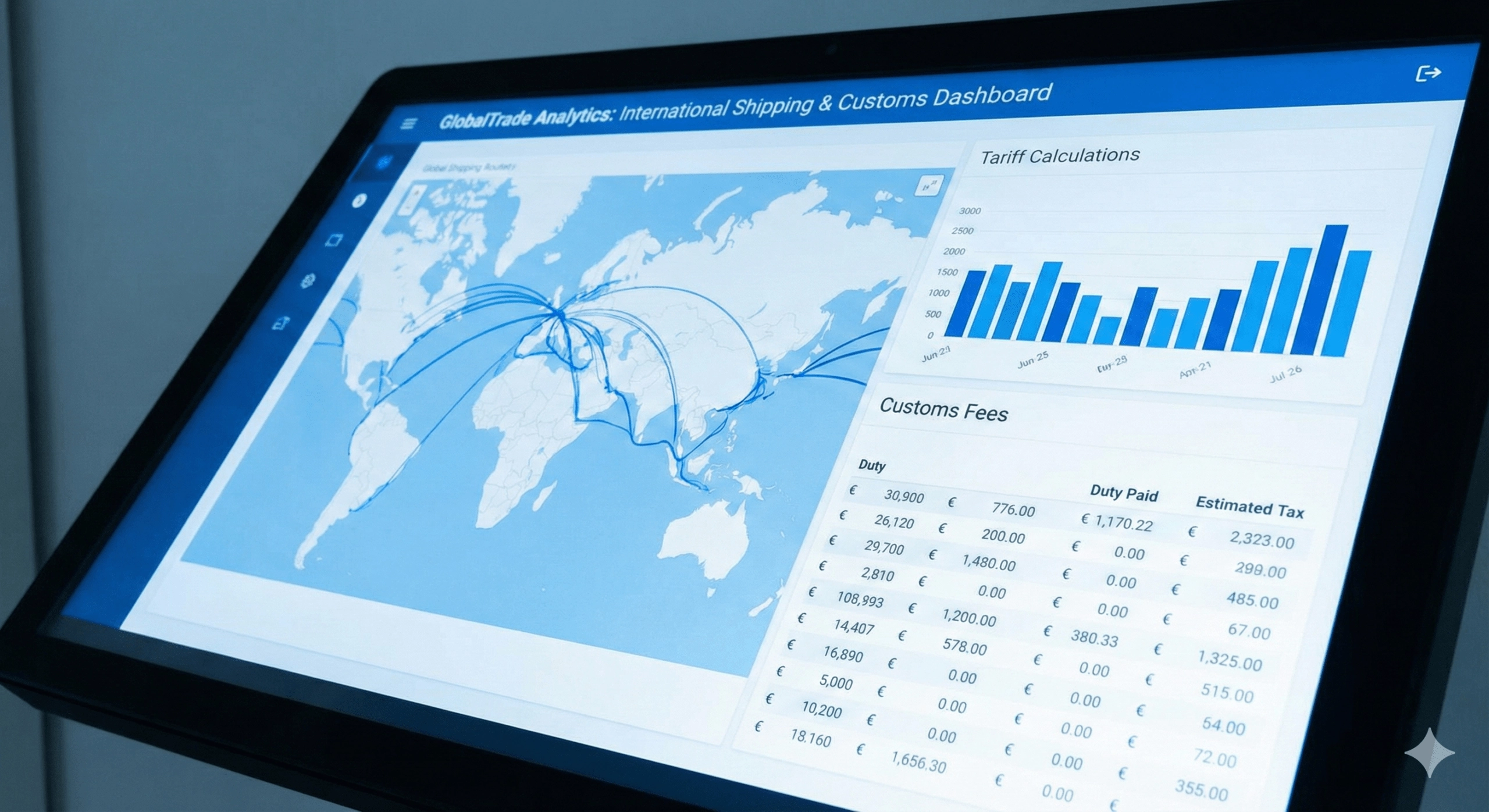The health and wellness industry has seen exponential growth recently, with the potential to progress further in the coming years. In fact, the wellness supplement market is forecasted to reach US $375.97 billion by 2030. As health-conscious consumers worldwide increasingly seek preventative products, supplement businesses have looked to international shipping to expand their market reach. But can you ship supplements internationally?
The short answer is yes; however, you’ll need to understand proper shipping procedures and regulations for each country you plan to target. Marketing to an international audience opens new opportunities for supplement businesses to increase sales, discover new market trends, and grow a current customer base.
While shipping internationally can bring significant advantages, challenges can also arise when going beyond borders. Every country outlines specific health regulations and shipping requirements for transporting materials like vitamins or dietary supplements. Failure to follow international shipping laws and procedures could result in costly delays, seizure of products, or detrimental fines.
This post will explore everything from country-specific regulations to potential legal consequences to packaging requirements to help you safeguard a smooth and compliant shipping process.
Can You Ship Supplements Internationally? The Varied Landscape of Supplement Regulations
Offering international shipping for your products allows your business to remain relevant in a progressively competitive market. With proper precaution, an increased target audience can be a recipe for increased revenue. However, regulatory frameworks will differ in various countries causing international shipping to be a daunting venture for your e-commerce business.
While each country will vary in its rules and regulations, you can expect to complete the following steps before shipping supplements internationally.
- Research country regulations and requirements for shipping vitamins and supplements internationally before determining your target country.
- Fill out custom declarations to provide a detailed list of imported goods.
- Ensure all ingredients are permitted in the country to which you are shipping your supplement.
- Properly label your product to display health claims, ingredients, and nutritional information.
- Be mindful of taxes, shipping costs, and potential legal consequences of international shipping.
Different countries have health stipulations regarding what type of vitamin or supplement can be shipped internationally. What may be defined as a supplement in one country could be considered a drug in another. According to the Food and Drug Administration (FDA), a dietary supplement is a product containing a dietary ingredient intended to supplement one's diet and support nutritional needs. Dietary ingredients include bioactive compounds such as Vitamin C, Vitamin D, or other supportive compounds like fish oil, calcium, or amino acids.
Prescription drugs have different regulations strictly enforced by the Drug Enforcement Agency (DEA). For example, pharmacies, medical practitioners, or other distributors registered with the Drug Enforcement Administration can ship prescription drugs to particular regions. However, shipping prescription drugs without one of the following titles is strictly prohibited.

Ensuring Compliance with Country-Specific Regulations
Before you begin an international shipment process, it's essential to take the time to understand country-specific shipping regulations before embarking on new territory.
FDA Regulations in the United States
According to the FDA, any shipment of dietary supplements into the U.S. requires a prior notice filed with the FDA. The FDA must electronically receive and confirm a prior notice before the supplement shipment arrives at the port of arrival in the U.S. Most over-the-counter medications, like Tylenol, Ibuprofen, or multivitamins, are safe to ship for personal use, given the shipper complies with local and federal laws.
Further, any dietary supplement must be regulated to ship unless exempt. Proper regulatory information to ship supplements includes the following:
- Current Good Manufacturing Practice (CGMP)
- Proper Labeling and Ingredient List in English
- Warning Letters, Health Claims, and Safety Information
Following the proper guidance documents and regulatory information can help you achieve a compliant shipping process in the USA.
Health Regulations in Canada
The United States currently dominates the health and wellness market, but many other countries, such as Canada and Australia, are eager to compete. As a neighboring country to the U.S., Canada may be a considerable match when selecting a country to ship supplements internationally.
The following health regulations are required to ship across Canadian borders:
- All natural health products must meet the requirements of the Food and Drugs Act
- All health products must include proper labeling and licensing and adhere to good manufacturing practices (GMP)
- Supplements cannot contain any ingredients listed on Health Canada’s prescription drug list
Health Regulations in the European Union
The European Union requires all food supplements to be regulated under the European Food and Safety Authority (EFSA). They define food supplements as a product that serves to supplement the average diet and requires the product to market a recommended dose. One country's regulations may define a supplement differently based on the dose amount. For example, Vitamin D3 5000 International Units (IU) is defined as a drug in the European Union. In the U.S. however, Vitamin D is considered a dietary supplement.
The EU also specifies which food supplements may be sold using an annex known as a "positive list." This list provides dose recommendations and requires labeling any dietary supplements as "food supplements."
Additional requirements include the following:
- Recommended daily dose
- Warning labels
- Health statements
Ongoing risk assessments will also take place to ensure product safety and compliance. This results in ever-changing regulatory processes that require precise attention to detail to remain compliant when shipping internationally to the EU and other countries.
TGA Regulations in Australia
The Australian community defines supplements as therapeutic goods and expects companies to meet high quality and safety regulation standards. Additionally, therapeutic goods must be regulated for international shipping. The process involves pre- and post-market assessment, enforcement of standards, a proper manufacturing license, and verification of overseas manufacturers' compliance with the same standards as their Australian equivalents.
Qualifications for international shipping include:
- TGA approval obtained by Australian sponsors for overseas manufacturers
- On-site inspections of the overseas manufacturers
- Good Manufacturing Practice (GMP) clearance
Further, any therapeutic goods must be entered into the Australian Register of Therapeutic Goods (ARTG) before legally importing the products into Australia.
Each country has a specific list of conditions for mailing. Countries like Japan, China, and South Korea have stringent regulations and policies for product registration. Mexico requires that all food supplements obtain a Federal Commission for the Protection against Sanitary Risk permit (COFEPRIS) to comply with health and safety regulations to protect consumers—without which, supplements will not be cleared with Mexican customs.
It's also important to be mindful of shipping supplements like protein powders or exclusively marketed weight-loss supplements, as they may be considered prohibited items based on the ingredients. Common banned ingredients include DMAA (1,3-Dimethylamylamine), ephedrine alkaloids, anabolic agents, or any supplements with high amounts of caffeine or marketed with a high dose.

Understanding Customs and Import Duties
Customs authorities play an essential role when shipping supplements to your destination country, as they determine whether a supplement shipment may leave or enter a country. Customs authorities ensure the supplements imported are safe for consumer consumption and comply with country-specific regulations.
Customs authorities:
- Inspect and verify legal documentation
- Ensure supplement shipments meet health and safety regulations
- Check for proper labeling and packaging
- Identify prohibited or restricted materials/ingredients
- Collect import duties, taxes, and fees according to the country's tariff schedule
Along with ensuring product safety and proper documentation, customs officers also classify imported supplements according to a global classification system known as the Harmonized System (H.S.). International shipments require an H.S. code to define a product. This classification also helps customs determine the applicable duties, taxes, and any specific regulations that may apply. The Census Bureau offers a free online research tool to help you classify your products, but it's also essential to determine your country-specific H.S. code for international shipments.

Properly Filling Out Shipping Paperwork
Missing paperwork is one of the most common reasons for international shipping delays. It is vital to complete proper documentation of your products to ensure timely compliance with customs authorities.
Some of the required documents for supplement shipments include:
Commercial Invoice: An invoice used for international deliveries that will include information like the product name, description, quantity, unit price, and currency.
Certificate of Origin: A document declaring where the goods were manufactured.
Certificate of Analysis: Summarizes all tests performed on the products to ensure the highest quality and purity before shipping.
Customs Declaration: Lists the details of goods imported or exported to a country.
Product Registration Certificates (if applicable): Many countries require supplements to be regulated prior to shipping. However, certain products may be exempt depending on the country.
Meeting Labeling and Packaging Requirements to Avoid Delays and Seizures
Supplements are particularly sensitive products to ship internationally, as many countries deem supplements as food requiring high attention to detail to package the products correctly according to country-specific regulations. For example, certain vitamins like probiotics are perishable if not refrigerated. Drastic temperature changes or shipping in areas with high humidity can destroy the quality of a product if not packaged properly.
Not only does this risk violating international shipping protocols, but improper packaging also results in product waste, costing your businesses more in the long run. Product waste is particularly important when shipping large quantities of supplements, as customs authorities reserve the right to seize or destroy packages they deem hazardous or unsafe. Often, a shipment will be seized due to a lack of documentation, outstanding fees, or unpaid taxes.
Overcoming Shipping Delays and Seizures
To avoid product seizure, it’s important to properly label all packaging to display temperature requirements along with other special conditions to ensure quality assurance.
These can include your business name, name of the manufacturer, net weight, use by date, and labeling of any hazardous materials contained in the packaging. If your products are withheld in customs, the importer can dispute the seizure by filing an appeal. The shipper may also be able to redirect the goods to an authorized facility for further investigation; however, this will cause timely delays in your shipping process.
In addition to avoiding delays, determining proper packaging regulations also helps you budget your average shipping costs. Although, your rate of duty will be determined by the tariff of the product you are importing.
Failure to comply with international shipping laws could result in legal ramifications like detrimental penalties or fines. Working with an experienced customs broker can help you become familiar with laws and regulations and help you determine the proper classification for your supplements, payments, taxes, and other customs entry details to avoid delays or seizures.
Partnering with a Reliable Shipping Company
By working with a reputable and experienced shipping carrier with a comprehensive knowledge of global shipping regulations and procedures, you can mitigate potential shipping issues and avoid violating import restrictions.
ePost Global has years of experience, knows country-specific regulations and understands how to package sensitive materials, such as wellness supplements, without risking violations or product seizures.
Our expert customer service representatives can provide shippers with valuable information such as customs procedures, country-specific regulations, tracking, and delivery updates to avoid delays or miscommunication when shipping supplements internationally.
Choose ePost Global to Ship Your Supplements Internationally
So, can you ship supplements internationally? Yes, and with the right shipping partner, sending wellness supplements across borders doesn’t have to be complicated. At ePost Global, we combine global experience with customized services and shipping options to meet your unique international mailing and shipping needs. ePost Global’s worldwide network offers many benefits for eCommerce businesses looking to expand their market reach and provides exceptional customer experience in the process.
Staying on top of regulatory changes and quality assurance frameworks can present an unnecessary burden for your team. Partnering with ePost Global simplifies the international shipping process so you can focus on what you do best while we handle the intricacies of shipping.
Get in touch with ePost Global today to learn more about shipping supplements internationally to grow your business.









